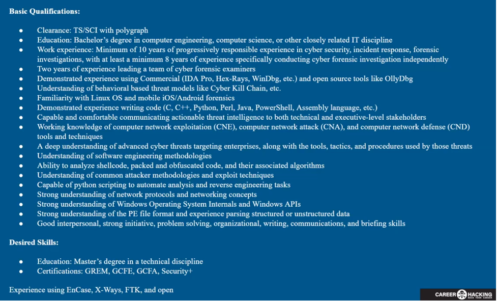INSIDE THE 
NEWS + ADVICE
Job Seekers: You Read a Bad Job Ad, Now What

Kirsten Renner, Senior Director of Recruiting at Novetta, now an Accenture Federal Services company, shares tips to help job seekers navigate poorly written job postings.
I hate seeing so many people challenged by job descriptions that are confusing. Some job ads have titles that don’t go with the description, they have way too many requirements, or they’re totally unreasonable. As candidates, we should look at this as just another challenge that we have to get through.
I have taught managers for years how to write better descriptions. But the key is to have a way of getting through the bad job descriptions, because I don’t think we can ever really fix that problem completely. In other words, even though those obstacles exist, and likely always will, there are ways to get through it. Looking for a job is an engineering problem. Gather the requirements, do some QA, launch (get out there) and keep updating!
The Job Ads We’re Talking About
What do I mean by bad job ads? Well, there’s the completely nonsensical ones, such as a senior level role that states a GPA requirement in the job posting. Then there’s the unreasonable ones – like labeling a reverse engineering role as “entry-level” when it clearly isn’t. And every once in a while, you get a rare gem, where the company did a really good job.
Other times it seems like there are hidden messages in the job description. What do you mean by “fast-paced environment?” You’re going to make me do 20 different things? Or does “looking for a self-starter” mean you don’t have good leadership? What does it mean?
When employers use these types of phrases, they’re not always conveying a hidden message. But as the candidate, you read it and assumed something. Write down the questions that a job ad brings to mind for you, because you’re going to ask about them later.
Use Job Ads to Fuel Your Research
People of color, women, and other underrepresented groups are statistically less likely to apply for a position they don’t look like a match for on paper. Try not to let this stop you. You may find that you’re qualified for the job after doing some research and asking questions. This might sound surprising to anybody who is struggling to find a job, but it’s a candidates’ market. You’re the one in the position of power here.
You may not think it’s worth fighting past a description that makes no sense, but you will encounter many of them in your job search. I urge you to do some research before discounting them all and moving on to the next. About half of the people who read poor job descriptions will not even apply, but hopefully you will look at them as opportunities. With a little investigating you may uncover a great position that’s the right fit for you.
Regardless of the quality of a job ad, whether it’s good or bad, one thing is indicative—the company is hiring. Next, you need to figure out if it’s the right company for you. Think of a job ad as a starting point for a research project. After reading the job posting you want to gather information to find out:
- What does their culture look like?
- Who works there?
- What are employees saying about their jobs?
- How have employees changed or progressed over time there?
- Do these things match up with where you currently are in your journey?
Look at their social footprint online to answer those questions. LinkedIn is at your disposal to find out who works there. What are they saying about their job, their teams, and their bosses? When you look at their LinkedIn profiles, also see if they’ve moved around much. Have they changed and progressed throughout their career path within one place or do they have to move to a new company to get the next title? That’s going to indicate what could happen for you potentially in the same place.
Rank What’s Important to You
When you’re determining your requirements for your next opportunity, think about what matters to you, whether it’s flexibility in your schedule or opportunities to grow. Remember, you’re going to discover some of these things when you’re researching the company.
So, what matters to you the most? Think about it in the same way that all the job descriptions are written—required versus preferred. You need to figure out the difference between what you require and what you prefer as a candidate. What is a deal-breaker for you? Then you’ll be able to rank the things that you’ve discovered and proceed accordingly.
Questions to Note When Reading a Job Posting
We’re going to look at an example job ad that’s actually quite typical. My first impression is that they might have mixed up what’s a requirement and what’s a preferred/desired skill. There’s a lot going on under the basic qualifications here, so let’s walk through it.

The very first bullet point says “polygraph.” Do you mean a CI poly or a full-scope poly? Do I need to be eligible for a polygraph? Or do you mean I should have passed one in a certain number of years? These are all reasonable questions to ask, so note them as you go.
Looking next at education, does comparable experience account? Well, it must in my case for pretty much every job I’ve ever had since I don’t have a degree. This is an example of why you shouldn’t rule yourself out from the get go. Just note it as a question for now to find out if comparable experience will suffice.
Then a few bullets down they mention all of the demonstrative experience that you need in these commercial tools.

When you say “open source,” do you also mean Wireshark? You list all of the different languages like C, C++, and Java, but you don’t say objective C. What if I had scripted, but I never created executable code from scratch? You get my point – they should have separated this out.
The question you would then have, first at the recruiting level and then at the hiring manager level is, “Do I have to have all of these things? Do I have to have some of these things? Is one equivalent to the other?” I think most software engineers would say that they’re not, so those are reasonable questions.
Now down at the bottom where it says things like “strong” and “good,” those are subjective terms. Make a note to ask, “How are you measuring these things? How do you quantify them? How do you determine what is strong and what is good?”

There’s a lot to unpack here, just looking at a few bullet points. Make note of these questions – they’re all worth asking. Be ready to address all the questions you come up with proactively, in advance of being asked about it in an interview.
Addressing Roadblocks in the Interview Process
I’m the perfect example of someone who isn’t qualified for their current or last position, because I don’t have a degree. If you’re in the same position, be ready to ask, “Are you going to provide me the opportunity to get a degree? Are you going to pay for me to go to school? Do you have that as a benefit? And do you accept experience that is equivalent?”
When it comes to certifications, you can ask the recruiter upfront and then the hiring manager, “What training do you provide?” Certifications can be pretty expensive. Are they going to be paying for those or providing assistance?
To get to the interview table, you have to get through the recruiter first. The best companies will have recruiters that will make time for you. They will listen to your questions. When they don’t know the answer, the best recruiters are going to be honest with you and they’re going to get back to you. They’re going to assist you. You are your best representative, but they become your agent—they work for you.
When you get to the interviewer, remember that your recruiter got you there. Now you need to be your own best advocate. Address any and all of the things that you identified when you were looking through the job ad, or questions that came up when you were speaking to the recruiter.
The interview is the time for you to address any of the questions that you came up with, in advance of them even being asked of you. For instance, “I don’t know this particular thing or that particular thing. I noticed in the description you’re looking for XYZ. I however have ABC and 123. Is that going to suit me?” Get all those questions asked at that point. Then you can compare what you learn in your interviews to your findings from the online research you conducted after initially reading the job ad. The more information you gather will help you to make the best decisions when you’re presented with offers.
As you look for new opportunities, do your research, build a target list of what’s important to you, figure out what your roadblocks are, and go into your interviews prepared with questions. There will always be job ads that aren’t written as well as they could be. But if you’re willing to do your homework, decipher what they’re really looking for, and ask the right questions, you’ll open the door to many more possibilities.

Kirsten loves helping the community, so if you want to reach her you can find her via LinkedIn and Twitter.
This entry was posted on Monday, September 13, 2021 2:20 pm